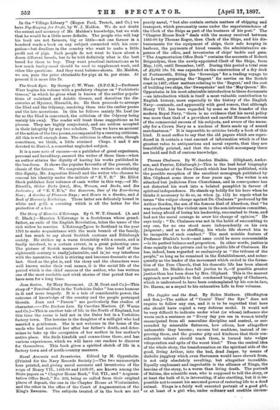Naval Accounts and Inventories. Edited by M. Oppenheim. (Printed for
the Navy Records Society.)—The two manuscripts here printed, and giving naval accounts and inventories of the reign of Henry VII., 1485-88 and 1495-97, are known among the State papers as " Chapter House Book," VoL VII., and " Augmen- tation Office Book," No. 316, being so called from their original places of deposit, the one in the Chapter House at Westminster, and the other in the office of the Court of Augmentation of the King's Revenue. The subjects treated of in the book are not
purely naval, " but also contain certain matters of shipping and transport, which presumably came under the superintendence of the Clerk of the Ships as part of the business of his post." The "Chapter House Book" deals with the money received between 1485-88 by Thomas Roger, then Clerk of the Ships, and his dis- bursements for the equipment of ships, their safe keeping in harbour, the payments of hired vessels, the administrative ex- penses of the office, ,and inventories of ships' tackle and gear. " The Augmentation Office Book" contains the accounts of Robert Brigandyne, then the newly-appointed Clerk of the Ships, from May, 1495, until December, 1497. During this period a total sum, of £2,061 18s. 7d. was expended on the construction of a dry dock at Portsmouth, fitting the ' Sovereign ' for a trading voyage to. the Levant, preparing the Regent ' for service on the Scotch coast in 1497, other matters relating to the ' Regent,' and the cost of building two ships, the • Sweepstake' and the May Queen.' Mr. Oppenheim in his most admirable introduction to these documents —an introduction which is itself a most valuable contribution to English history, more especially to the history of the English Navy—contends, and apparently with good reason, that although Henry VII. has been regarded by some as the founder of the modern Royal Navy, "there is no evidence that his naval policy was more than that of a provident and careful Monarch desirous of the commercial success of his subjects, and aware of the neces- sity for a Crown Navy as a nucleus of fleets made up of armed merchantmen." It is impossible to criticise briefly a book of this kind. It must suffice to say that the old papers which are repro- duced in it contain a vast amount of information which is of the- greatest value to antiquarians and naval experts, that they are beautifully printed, and that the notes which accompany them are lucid and full of curious knowledge.


































 Previous page
Previous page